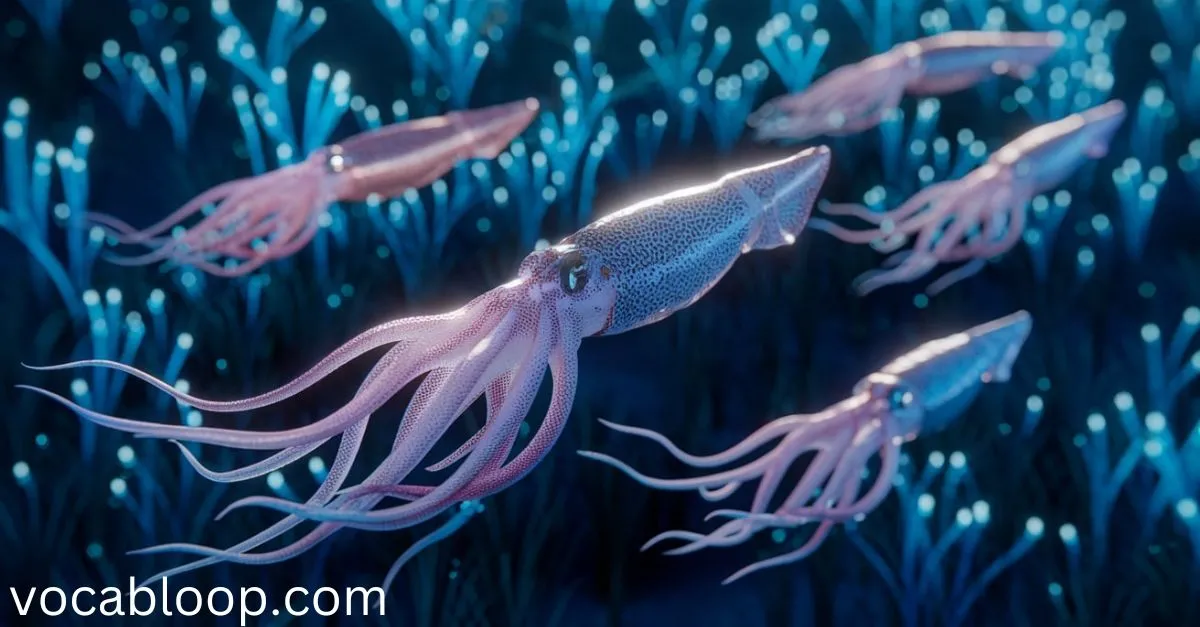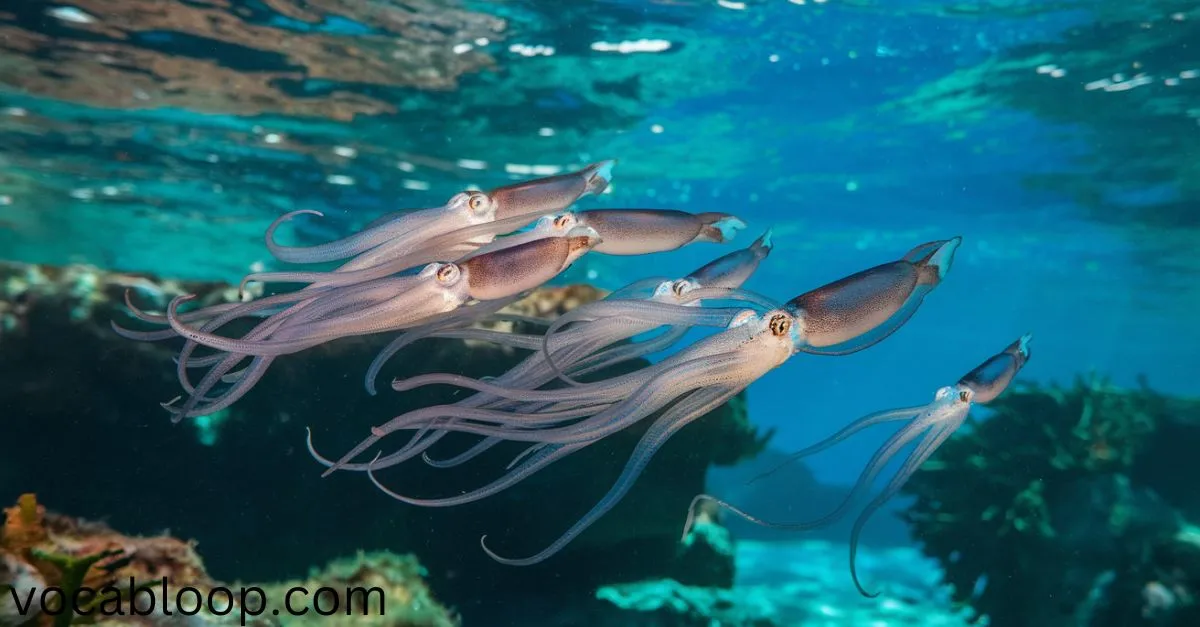The word “squid” might seem straightforward, but its plural form often sparks confusion. Is it “squid” or “squids”? This question perplexes both native English speakers and language learners alike. The uncertainty arises from the fluid and evolving nature of the English language, influenced by historical and cultural factors. Grammatically, “squid” functions as both singular and plural, much like “deer” or “sheep.”
For example, “One squid is swimming” and “Many squid are swimming” are both correct. However, “squids” can also be used, especially when highlighting different species or groups, such as “Squids from various regions were studied. “In this article, we’ll explore the definition of “squid,” its grammatical usage, and the contexts for its plural forms. Whether you’re a marine biology enthusiast or a language learner, this guide will clarify all your doubts.
What Is the Plural of Squid?

The plural of squid can either remain “squid” or change to “squids”, depending on the context. The unchanged form, “squid”, is more common in scientific and general writing when referring to multiple aquatic creatures of the same species. For example, “The deep sea is home to many squid.”
On the other hand, “squids” is often used when referring to different species. For instance, “Marine biologists study squids from various parts of the world.” Both forms are correct, but their usage depends on the situation. To remember this distinction, think of “squid” as uncountable when talking about groups and “squids” as countable when emphasizing variety.
Is the Squid Word Correct?

Yes, “squid” is correct as both a singular and plural noun. In singular form, it refers to one marine creature with a streamlined body, 10 long arms, and advanced adaptations for underwater life. Its plural form can vary, as discussed above, but the singular “squid noun” is always correct.
Interestingly, the word “squid” is derived from earlier maritime terms, reflecting the creature’s deep ties to ocean life. Understanding its usage can be tricky, especially when comparing it with similar words in English. That’s why resources like the Britannica dictionary and other language guides are helpful for learners.
Definition
The Britannica definition describes a squid as a marine animal belonging to the cephalopod family. These creatures are soft-bodied, with elongated forms and 10 arms, which include two long tentacles. Squid are known for their agility and ability to release ink to escape predators.
In terms of language rules, “squid” serves as both a singular and plural form, making it a fascinating word for anyone interested in language assistance or grammar nuances.
Meaning
In its simplest sense, “squid” refers to an aquatic organism often found in oceans around the world. Squid are not just interesting as sea animals; they also play a vital role in marine biology and ecosystems. From the tiny pygmy squid to the massive giant squid and colossal squid, these creatures captivate scientists and the public alike.
For language learners, the term can also be a fun part of vocabulary-building. Its dual plural forms make it a frequent topic in word challenges and knowledge tests, helping to test your knowledge of grammar and usage.
Usage
Squid is widely used in everyday speech, scientific contexts, and creative writing. You might say, “I ordered calamari, which is made from squid,” or “The aquarium exhibit showcases squid from different species.” The term also appears in art and design, inspiring mosaic decorations and other artistic creations.
Whether you’re discussing a large squid from the deep sea or creating an art form inspired by their beauty, knowing how to use “squid” correctly enhances your communication skills.
Plural of Squid as a Part of Speech
The word “squid” serves as both singular and plural without modification.:
| Singular | Plural |
| “A squid is swimming.” | “Many squid are swimming.” |
This dual use is common in formal writing, where “squid” remains unchanged. However, the term “squids” can also be correct when referring to multiple species or emphasizing diversity, as in, “Squids from different species were observed.”
This variation aligns with standard language rules, allowing flexibility based on context. Whether using “squid” or “squids,” the meaning depends on the intent and grammatical framing of the sentence.
Pronunciation of Plural of Squid

The pronunciation of “squid” is simple: /ˈskwɪd/. This remains consistent whether used in its singular or plural form, “squid” or “squids.” To speak it clearly, emphasize its short, crisp sound by practicing slowly and deliberately. Pay attention to the sharp ending, ensuring it doesn’t blur into nearby words.
Tools like phonetic transcriptions and online audio guides are excellent for honing your pronunciation. Repeating the word in different sentences can also help you master its usage and ensure clarity in everyday conversation.
Squid in British English and American English

The term “squid” is used similarly in British and American English, with only minor differences. Pronunciation varies slightly, as British speakers may emphasize the “d” more distinctly, while Americans typically pronounce it softer. In informal contexts, Americans are more likely to use “squids” as a playful variation, though this usage is rare and not standard.
In formal writing, both British and American English adhere to the same grammatical rules, using “squid” as both the singular and plural form. Regional preferences in tone and usage may occasionally emerge, but these distinctions are minimal, making “squid” an easily understood term across English-speaking regions.
Common Mistakes and How to Avoid Them
A common misconception is that using “squids” is always incorrect. In reality, its appropriateness depends on the context. For instance, “squid” is typically used as both singular and plural, as in “Many squid are swimming.” However, “squids” is valid when referring to multiple species, such as “Squids from diverse habitats were observed.”
Another frequent mistake is treating “squid” as uncountable in contexts requiring a plural form. To avoid errors, always consider the context and intended meaning. Relying on tools like grammar guides, language tips, and vocabulary quizzes can help you master these nuances and use “squid” confidently.
Origins of Plural of Squid

The word “squid” originates from maritime culture, likely derived from the slang term “squiddy,” used to describe soft-bodied creatures of the sea. Sailors and coastal communities often coined such terms to refer to marine life encountered during voyages. Over time, the word evolved, gaining recognition in scientific and everyday language.
Its dual plural forms, “squid” and “squids,” reflect the flexibility of English grammar, catering to different linguistic contexts and needs. This fascinating evolution highlights how language adapts to describe nature and science, making “squid” a notable example in grammar discussions and language studies, bridging marine biology with the dynamic world of linguistics.
Synonyms of Plural of Squid
Squid
- Calamari
- Cephalopod
- Mollusk
- Inkfish
- Ocean predator
- Tentacled creature
- Deep-sea creature
- Marine animal
- Marine creature
- Ocean life
Sentences in Daily Usage of Plural of Squid

Squid
- “The squid darted through the water, avoiding a predator.”
- “Squids from different regions exhibit unique adaptations.”
- “The deep-sea diver spotted several squid near the reef.”
- “Squids are fascinating creatures with high intelligence.”
- “A squid’s ability to camouflage is remarkable.”
- “Squids release ink when they feel threatened.”
- “The biologist wrote a paper on squid behavior.”
- “Squid are essential for maintaining marine ecosystems.”
- “Large squids often inspire myths about sea monsters.”
- “The fishermen caught squid for the local market.”
FAQs
What is the plural of “squid”?
The plural of “squid” can be either “squid” or “squids”, depending on the context. When referring to multiple squid of the same species, “squid” is commonly used. For example, “The fisherman caught many squid.”
How is “squids” different from “squid”?
The term “squid” is typically used to describe a group of these creatures without emphasizing variety. “Squids”, however, highlights different species or types. For instance, “Scientists are studying various squids found in the ocean.”
Why does “squid” have two plural forms?
The dual plural forms exist due to the flexible nature of English grammar. “Squid” serves as a collective noun, while “squids” is used to emphasize diversity among species. Both are correct, but their usage depends on context.
Are there regional differences in the pluralization of “squid”?
There are minor differences. In British English, “squid” is more commonly used in both formal and informal settings. In American English, “squids” might appear informally, especially when discussing multiple species.
Can “squids” be used informally?
Yes, “squids” is often used informally to refer to different species or emphasize variety. However, in scientific or formal contexts, “squid” is preferred unless species distinctions are being made.
Conclusion
Mastering the plural of “squid” can enhance your writing, speech, and appreciation of language, while also deepening your understanding of the marine world. The term “squid” serves as both singular and plural in most contexts, like “Many squid swim in the ocean.” However, “squids” is used to highlight variety, such as “Squids from different species were observed.”
Whether you’re discussing marine biology, tackling a language quiz, or enjoying a plate of calamari, knowing when to use “squid” or “squids” is crucial for clear communication. Always consider the context, consult reliable resources like Britannica for clarity, and embrace the complexities of language. With practice, you’ll navigate these distinctions effortlessly and enrich your vocabulary in the process.

Alex Hormozi is a seasoned blogger at Vocab Loop, known for his deep insights into language, vocabulary, and grammar. With years of experience in writing, Alex shares practical tips and effective strategies to help readers improve their linguistic skills and enhance their writing abilities.

